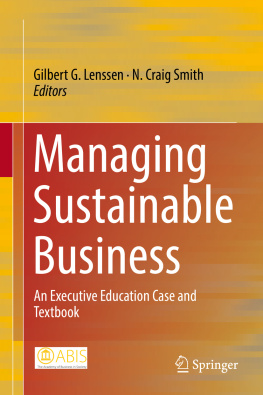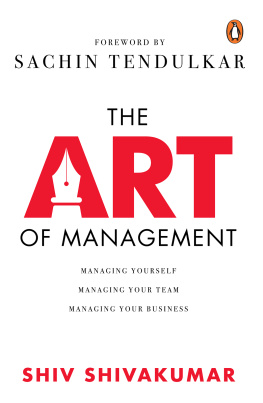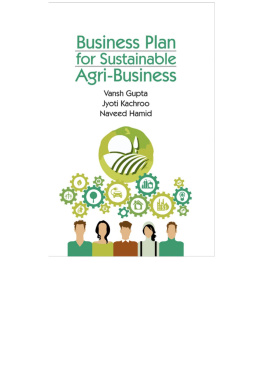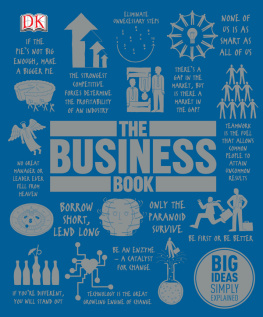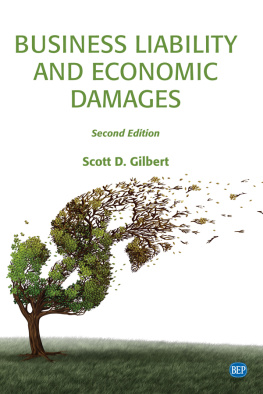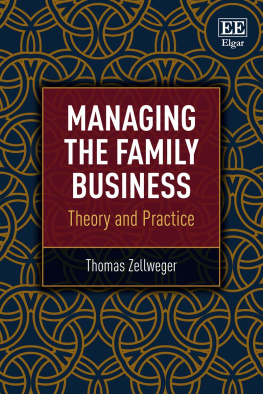Gilbert G. Lenssen - Managing Sustainable Business
Here you can read online Gilbert G. Lenssen - Managing Sustainable Business full text of the book (entire story) in english for free. Download pdf and epub, get meaning, cover and reviews about this ebook. year: 0, publisher: Springer Netherlands, genre: Business. Description of the work, (preface) as well as reviews are available. Best literature library LitArk.com created for fans of good reading and offers a wide selection of genres:
Romance novel
Science fiction
Adventure
Detective
Science
History
Home and family
Prose
Art
Politics
Computer
Non-fiction
Religion
Business
Children
Humor
Choose a favorite category and find really read worthwhile books. Enjoy immersion in the world of imagination, feel the emotions of the characters or learn something new for yourself, make an fascinating discovery.
- Book:Managing Sustainable Business
- Author:
- Publisher:Springer Netherlands
- Genre:
- Year:0
- Rating:4 / 5
- Favourites:Add to favourites
- Your mark:
- 80
- 1
- 2
- 3
- 4
- 5
Managing Sustainable Business: summary, description and annotation
We offer to read an annotation, description, summary or preface (depends on what the author of the book "Managing Sustainable Business" wrote himself). If you haven't found the necessary information about the book — write in the comments, we will try to find it.
Managing Sustainable Business — read online for free the complete book (whole text) full work
Below is the text of the book, divided by pages. System saving the place of the last page read, allows you to conveniently read the book "Managing Sustainable Business" online for free, without having to search again every time where you left off. Put a bookmark, and you can go to the page where you finished reading at any time.
Font size:
Interval:
Bookmark:
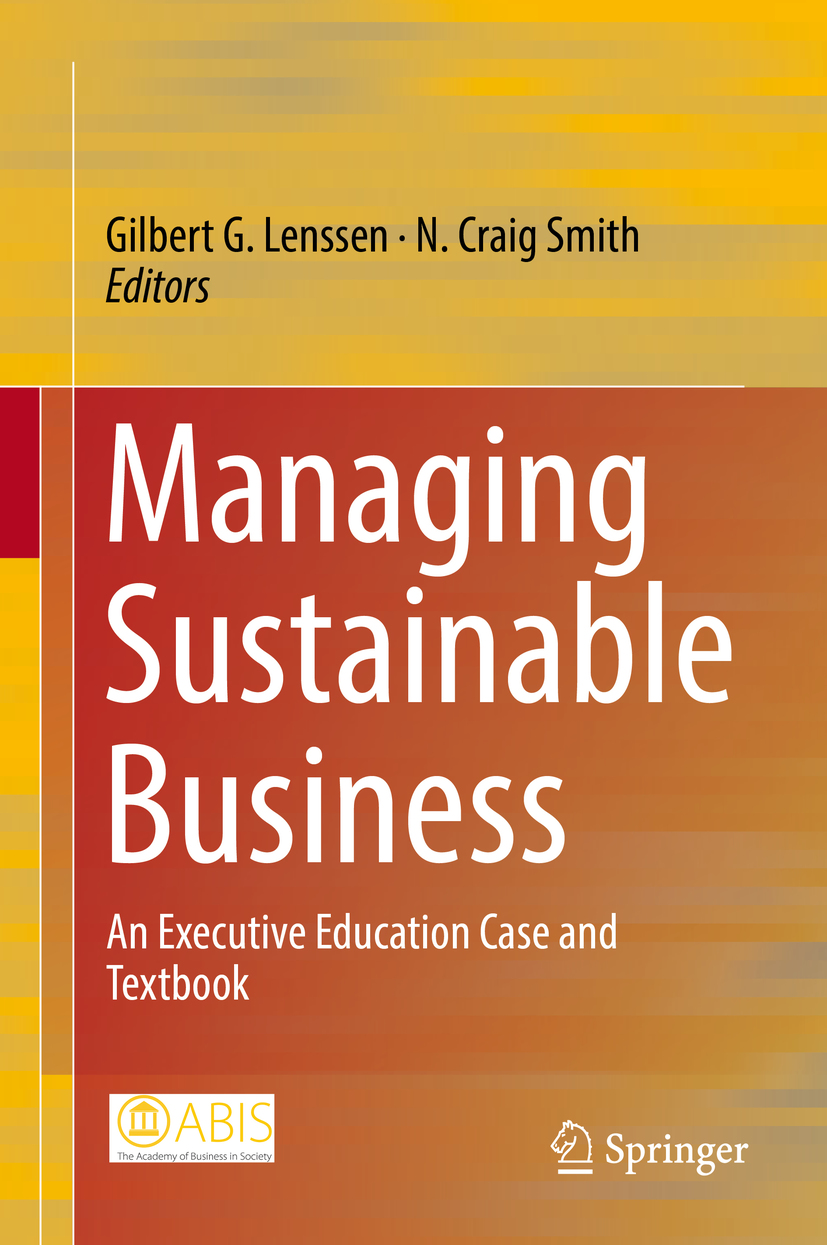

This Springer imprint is published by the registered company Springer Science+Business Media B.V. part of Springer Nature.
The registered company address is: Van Godewijckstraat 30, 3311 GX Dordrecht, The Netherlands
This book provides an excellent framework for managers to pursue sustainable business in a strategic way. At the same time, it is a learning model, starting with the foundations of risk management and stakeholder management and moving on to the more complex challenges of strategic differentiation and business model innovation. The most challenging part however is the organizational change management and talent development which needs to follow or go hand in hand with the strategic processes.
The wealth of case studies and supporting texts is derived from the legacy of ABIS The Academy of Business in Society where business schools and companies are working together to enhance the knowledge base for sustainable business. The book follows the rationale of the business manager in a very practical manner, and I hope it will be widely used in executive education and become a core part of learning and talent development.
Before I joined Solvay S.A., I was the CEO of a pharmaceutical company, the chairman of the Belgian Employers Association and one of the hundred founders of the Club of Rome in 1968. I was convinced of the necessity of sustainability whether environmental, social or ethical.
During my stay at the helm of Solvay S.A. (19842006), our global company became even more global and even more conscious of the rising global sustainability challenges. As a 150-year-old family-controlled company, we understood very well what sustainability meant. My management colleagues and I, with the support of my family shareholders, decided increasingly to take strategic decisions and operational execution only when we could grow profitably in a sustainable way, with due respect for environmental, social and ethical issues. With these principles in mind, we have reorganized some businesses, we have sold businesses where we could no longer see profitable growth with sustainability, and we have acquired businesses where we could see growth with sustainable profitability.
This book offers managers a systematic approach for pursuing sustainable profitability by integrating economic, social, environmental and ethical dimensions in business strategy and decision-making. As a member of the INSEAD Advisory Council, I have argued for a long time that the future of capitalism is in peril if despite its global and remarkable successes business cannot control and minimize its failures and excesses (greed, inequality, corruption, climate change, social injustice, etc.). The solution must be a more sustainable market economy. I am convinced that businesses, when profitable, sustainable and innovative, are a force for good, for a better world. I think therefore that the business schools curriculum should address the sustainability challenges in serious ways. I am very happy to see that this book offers a down-to-earth framework for making this happen. I congratulate the editors and the authors for their unique contribution to business education.
In this chapter, we are presenting an outline of the conceptual framework for this book. This framework is also a step-by-step model for managers to identify risks and opportunities for sustainable business and therefore also a managerial framework for decision making, as well as a supervisory framework for the board.
As set out in the introductory chapter, the key to sustainable business is in achieving the right balance between managing competitiveness and profitability for attractive returns to shareholders with managing the political, social and ecological context of the business which in turn can enhance competitiveness and profitability. Managing the context of the business is focused on both protecting value against sustainability risks and creating new value from sustainability opportunities. In managing context, the business is perceived as generating benefits for all stakeholders (including its shareholders) and as a credible and trustworthy player for these stakeholders.
Risk Management focusses on the accountabilities of the business and consists of knowledge management of inside-out impacts of the business model and the business strategy. Risk management is about managing accountabilities for impacts (externalities) in shifting social contract environments. Oil companies like Shell and BP are held accountable for all environmental impacts, even if they operate within the law and governmental regulation (Shell) or if the impacts have been caused by a subcontractor (BP).
Issues Management focusses on the more vague responsibilities of the business and consists of knowledge management of outside-in impacts of new issues from the business environment on the business. Issues management is about adopting appropriate organisational responses for latent, emerging and maturing issues of responsibility. In the face of controversy on child labour, Nike had to shift from a defensive and compliance approach to a strategic approach by changing its business model and seeking industry sector agreements as the child labour issue matured over the years.
Font size:
Interval:
Bookmark:
Similar books «Managing Sustainable Business»
Look at similar books to Managing Sustainable Business. We have selected literature similar in name and meaning in the hope of providing readers with more options to find new, interesting, not yet read works.
Discussion, reviews of the book Managing Sustainable Business and just readers' own opinions. Leave your comments, write what you think about the work, its meaning or the main characters. Specify what exactly you liked and what you didn't like, and why you think so.

